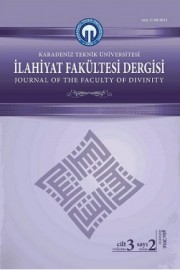Hanefî Fıkhında Maklûb Hadis Kullanımına Dair Bir Örnek: İskât Hadisi
An Example of Usage of Maqlub (Reversed) Hadith in The Hanafi School of Law: The Hadith of Isqat
Author(s): Üzeyir DurmuşSubject(s): Islam studies, Middle-East Philosophy, Philosophy of Religion, Sociology of Religion
Published by: Karadeniz Teknik Üniversites - İlahiyat Fakültesi
Keywords: Isqat; Dawr; Maqlub (reversed) Hadith; Hanafi school of law; Muhammad al-Shaibani;
Summary/Abstract: The isqat of prayers (i.e. paying expiation for missed prayers of the deceased) is a controversial issue in Turkey. The isqat, which is actually an opinion attributed to Muhammad al-Shaibani, a leading Hanafi scholar and nothing but a piece of his advice has been in due course regarded by people as an obligation. This misconception paved the way for another practice called dawr (i.e. the rotation of the payment in hands due to the shortage of money) to realize the isqat. This article endeavors to prove that the allegedly marfu’ (elevated) hadith which is deemed evidence to the practice of isqatis indeed a mawquf (stopped) and maqlub (reversed) hadith. The article also presents how the issue of isqat is dealt with by Hanafi scholars. Thereforehow transmission of a narration that some jurists converted it to a maqlub (reversed) hadith by next generations of jurists without examination has changed a practice devoid of an original proof into a very important ruling with an original proof isrevealed. The study thus emphasizes the significance of the examination of hadiths which are regarded as evidence to a ruling.
Journal: Trabzon İlahiyat Dergisi
- Issue Year: 3/2016
- Issue No: 2
- Page Range: 75-88
- Page Count: 14
- Language: Turkish

